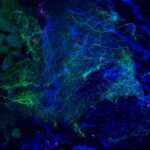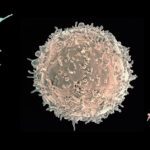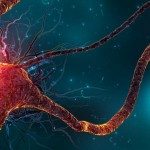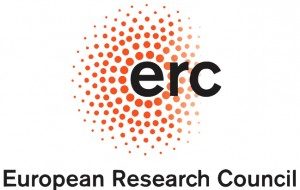Aleksandra Deczkowska, head of the group ‘Bain-Immune Interactions’ since 2021 at Institut Pasteur, received the European Research Council (ERC) Starting grant for her project BrainGate – Illuminating body-brain communication channels at the choroid plexus and their impact on brain physiology. She is among the 408 early-career researchers in Europe (and 39 in France) to receive this prestigious grant in 2022.
Aleksandra’s work focuses on a particular barrier surrounding the brain, called the choroid plexus (CP). This epithelium, whose main function is the production of the cerebrospinal fluid (CSF) perfusing the whole brain, is in close contact with the outside blood circulation. It therefore interacts with two main biological entities present in the blood, immune cells and microbial products, that cannot directly reach the brain. The key hypothesis of Aleksandra’s work is that the CP epithelium acts as an intermediary interface, sensing immune and microbial signals present in the blood and modulating in response the CSF properties to shape brain function.
The project BrainGate led by Aleksandra with the support of the ERC will investigate how the CP contributes to an efficient communication between the immune cells, the gut microbiota and the brain in several contexts, using spatial transcriptomics, CP-specific genetic manipulation using CRISPR and behavioral experiments. It will examine how this gut-blood-brain axis is established during post-natal development, paced along the circadian rhythms, and how it responds to gut microbiota perturbations. This will lead to a better understanding of the mechanisms regulating the blood-gut-brain axis and of the central role of the choroid plexus in these interactions.




